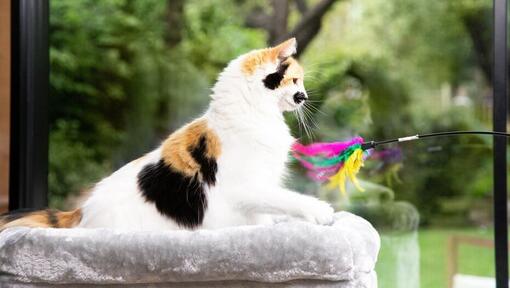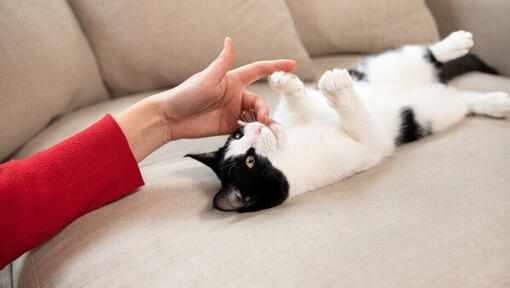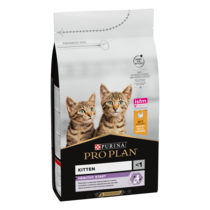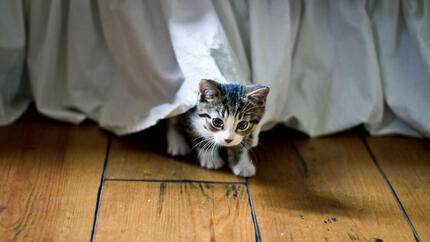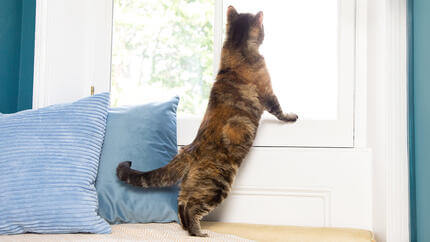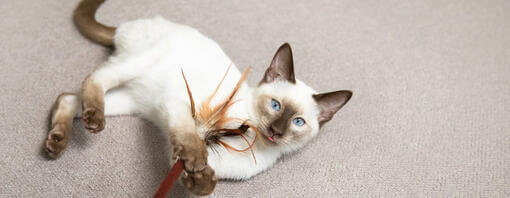

Playing with your little kitten is an invaluable part of your relationship with them. What’s more, playing on a daily basis helps both of you stay physically and emotionally healthy – what more excuse do you need?
Cats and kittens are playful by nature, they love interacting with you and the fun they have when playing is a reward in itself! Kitten play has numerous benefits for your cat, including encouraging exercise, helping you both bond and engaging their natural hunting instincts.
Most importantly, kitten play is incredibly fun for both you and your cat! We’ve put together this useful guide packed full of useful information to tell you everything from what toys they like best to the reasons behind why cats actually like to play. Keep reading to find out more.
Why do cats like to play?
According to VetStreet, your kitten’s love for play actually relates to their wild ancestors. What appears as ‘play’ is your cat actually learning vital survival skills such as how to stalk, chase and trap prey. While our domestic kitties don’t actually have any need for these hunting skills, the instinct will usually remain strong.
Kitten play will start from four weeks old, and you’ll notice them spending most of their time wrestling with other kittens as they figure out the social pecking order. From the age of seven to eight weeks old, they’ll turn their attention to predatory play with inanimate objects.
Benefits of playing with your cat
Play isn’t just a fun part of living with your cat, it’s actually an essential feature to help them stay emotionally and physically healthy. A few of the main benefits of kitten play include:
Cat and kitten play helps to express their natural hunting instincts, which is great to stimulate their mind and is an excellent form of cat exercise. The best kitten toys to encourage this type of play are fishing rod type toys and small, soft toys which can be rolled past them to attract their attention and encourage them to pounce and chase.
Playing for just 20 minutes a day provides lots of mental stimulation and important exercise for your cat, plus you’ll be strengthening the bond between you both. Play is essential for indoor cats to make sure they use up the energy they’d normally use for patrolling their territory and hunting prey.
It’s also important to know that indoor cats might need a longer play time or a couple of play sessions spread across the day. But if you have more than one cat and they enjoy playing with each other, or if your cat is older and less active, a short play session should be plenty.
Your kitten or cat’s peak play time is usually in the early morning and the evening; therefore, you should make sure that you play with them before bedtime so that your kitten’s just as worn out as you are – this will also help to prevent them meowing at night.
We all know that dogs burn off a lot of energy chasing balls, playing dog sports and being taken on walks, but for cats’ things might be different. Not many of us take our feline friends on walks and a lot of the time they could be doing anything – from stretching in the garden to snoozing in the sun! So how can you make sure your cat is getting enough exercise?
The answer is simple: have fun playing with them! From kittenhood right through to old age, they’ll love batting, chasing and pouncing all kinds of things! In fact, kitten play is one of the most enjoyable things about having them around the house.
Why should you use hide and seek cat games?
Your cat has a lot of natural intelligence that needs to be exercised in order to keep them satisfied, and one of the best ways to do this is by making them ‘hunt’ for their food.
A cat that is given food in any easy or boring way will want to occupy themselves in another manner – perhaps by clawing the sofa for your attention, or playing with things you don’t want them to. This could develop into a behavioural problem without careful attention.
Bored pets may also sleep a lot which makes them more lethargic, which in turn makes them want to exercise even less, leading to more weight gain. Rather than enter that vicious circle, a good hide and seek food game will combine eating with exercise, just as your cat would do in the wild.
In fact, making your cat's meal a form of playtime means they’ll never be bored by their dinner – and you’ll probably have tons of fun together!
Homemade kitten toys
Sometimes kitten toys can be expensive – but it doesn’t have to be that way! You can make excellent toys out of things that you may find lying around the house. Why not try one of the following:
- A bucket filled with crumpled paper or ping-pong balls can make a useful distraction. When your kitten attempts to stalk you, throw a ball downstairs for them.
- Leave a large paper bag on the floor for diving into and ripping to pieces, but don’t use plastic bags and cut off any handles that could get caught around your cat's neck.
- Cardboard boxes to jump in and out of are also fun. Glue several boxes together, linked by peepholes, for kitten hide-and-seek, and put a ball or mouse toy inside for extra excitement.
- Make a sack of fabric stuffed with dried catnip, which drives some cats wild!
Why are some cats more active than others?
Some cat breeds have a reputation for snoozing a lot of the time, while others are generally known for their active attitudes. Pure breeds with reputations for high activity include Siamese, Abyssinian, Oriental and Turkish Vans, while more laid back cats include the Persian, Himalayan, British Shorthair and Ragdoll breeds. But there are many active and fun kittens in rescue centres and shelters just waiting for homes and a new play partner!
Cats are just like us when it comes to exercise: some are simply more active than others. However, it’s not normal for your cat to sleep all the time and to be uninterested in interacting with you. Consult your vet if your cat is very inactive as this may indicate a medical problem.
Redirecting playful aggression
If your kitten is keen on attacking your ankles, try to redirect this behaviour onto their kitten toys instead. If you have just one kitten, you might be tempted to get another to solve this playful aggression.
Cats tend to be solitary animals, but two siblings will often get on well and will keep each other physically occupied. But you could just as easily end up with two predators instead of one! Consult your vet or a behaviourist for advice on dealing with an over-enthusiastic ankle-biter.
Keep your cat healthy through play
Overweight kittens can easily become overweight cats, and fat cats aren't healthy cats! Overweight cats are more likely to suffer from painful osteoarthritis and conditions such as diabetes and urinary problems. Keeping your cat at an ideal body weight is important. Kitten play and exercise will help control your cat's weight and prevention is always better than a cure.
To keep up activity levels, invest in some cat exercise toys, an indoor climbing frame or a scratching post. Introduce regular play sessions and remember that anything that moves will appeal to cats, as it gives them a chance to polish their hunting skills.
Want to find out more about caring for your kitten? Read our article all about kitten grooming.


